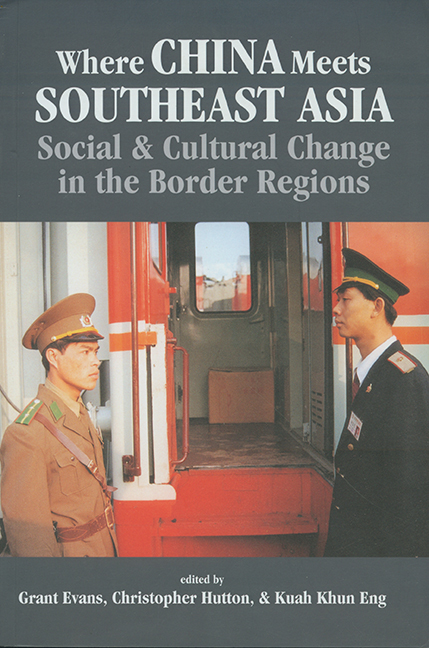Book contents
- Frontmatter
- Contents
- Contributors
- Map
- Introduction: The Disappearing Frontier?
- 1 Where Nothing Is as It Seems: Between Southeast China and Mainland Southeast Asia in the “Post-Socialist” Era
- 2 The Southern Chinese Borders in History
- 3 Ecology Without Borders
- 4 Negotiating Central, Provincial, and County Policies: Border Trading in South China
- 5 The Hmong of the Southeast Asia Massif: Their Recent History of Migration
- 6 Regional Trade in Northwestern Laos: An Initial Assessment of the Economic Quadrangle
- 7 Lue across Borders: Pilgrimage and the Muang Sing Reliquary in Northern Laos
- 8 Transformation of Jinghong, Xishuangbanna, PRC
- 9 The Hell of Good Intentions: Some Preliminary Thoughts on Opium in the Political Ecology of the Trade in Girls and Women
- 10 Cross-Border Mobility and Social Networks: Akha Caravan Traders
- 11 Cross-Border Links between Muslims in Yunnan and Northern Thailand: Identity and Economic Networks
- 12 Trade Activities of the Hoa along the Sino-Vietnamese Border
- 13 Cross-Border Categories: Ethnic Chinese and the Sino-Vietnamese Border at Mong Cai
- 14 Regional Development and Cross-Border Cultural Linkage: The Case of a Vietnamese Community in Guangxi, China
- 15 Women and Social Change along the Vietnam-Guangxi Border
- Index
14 - Regional Development and Cross-Border Cultural Linkage: The Case of a Vietnamese Community in Guangxi, China
Published online by Cambridge University Press: 21 October 2015
- Frontmatter
- Contents
- Contributors
- Map
- Introduction: The Disappearing Frontier?
- 1 Where Nothing Is as It Seems: Between Southeast China and Mainland Southeast Asia in the “Post-Socialist” Era
- 2 The Southern Chinese Borders in History
- 3 Ecology Without Borders
- 4 Negotiating Central, Provincial, and County Policies: Border Trading in South China
- 5 The Hmong of the Southeast Asia Massif: Their Recent History of Migration
- 6 Regional Trade in Northwestern Laos: An Initial Assessment of the Economic Quadrangle
- 7 Lue across Borders: Pilgrimage and the Muang Sing Reliquary in Northern Laos
- 8 Transformation of Jinghong, Xishuangbanna, PRC
- 9 The Hell of Good Intentions: Some Preliminary Thoughts on Opium in the Political Ecology of the Trade in Girls and Women
- 10 Cross-Border Mobility and Social Networks: Akha Caravan Traders
- 11 Cross-Border Links between Muslims in Yunnan and Northern Thailand: Identity and Economic Networks
- 12 Trade Activities of the Hoa along the Sino-Vietnamese Border
- 13 Cross-Border Categories: Ethnic Chinese and the Sino-Vietnamese Border at Mong Cai
- 14 Regional Development and Cross-Border Cultural Linkage: The Case of a Vietnamese Community in Guangxi, China
- 15 Women and Social Change along the Vietnam-Guangxi Border
- Index
Summary
My first visit to the Vietnamese community in Guangxi province in the People's Republic of China (PRC) was made possible thanks to special arrangements made by Mr Li, a retired middle-ranking government official of Fengcheng county. Mr Li is also a respected scholar of the Jing, an ethnic minority of Vietnamese descent. He brought me to his natal village Wanwei, where we joined a meeting with village elders to plan the celebration of the annual Hat Festival which would be held a week later in late July 1996. Wanwei is situated along the Gulf of Tonkin (Beibuwan) less than 20 kilometres from the Vietnamese border.
In the morning, Mr Li and I were picked up at his home in Fengcheng by Mr Zhang and his chauffeur in his Toyota Crown, a status symbol in post-Mao China. Mr Zhang, who is also from Wanwei, has been one of the most successful businessmen in the local Vietnamese community since he started cross-border trading in 1989, when the Sino-Vietnamese border re-opened. He now runs a big trading firm in Fengcheng. His Han-Chinese business partner from Sichuan, who was visiting Fengcheng, shared another car with three of Mr Li's fellow villagers who also were middle-ranking local government officials. This car was provided by their work units. It was thus a very mixed group that embarked on a trip of very mixed purposes — academic research, local religious affairs, and business.
A newly constructed toll highway links Fengcheng with Dongxing, a market-town right on the Vietnamese border. Half way along this road we turned off onto a well-paved road leading towards Wanwei, and before noon we arrived at the temple in the middle of the village. While discussing the arrangements for the Hat Festival with the village elders, Mr Li and Mr Zhang explained to me that this festival in honour of a local deity was important because it demonstrated the unique ethnic culture of the people.
The people living in Wanwei speak Vietnamese and call themselves Kinh, a term which has the same pronunciation in local Cantonese. The Chinese character for this ethnonym is jing in Putonghua.
- Type
- Chapter
- Information
- Where China Meets Southeast AsiaSocial and Cultural Change in the Border Regions, pp. 277 - 311Publisher: ISEAS–Yusof Ishak InstitutePrint publication year: 2000



